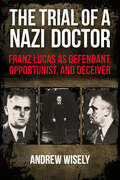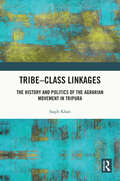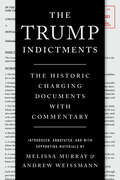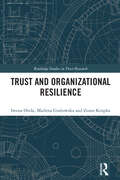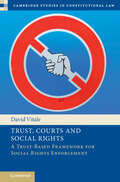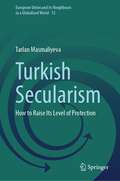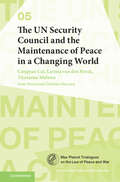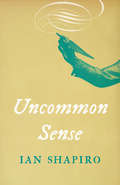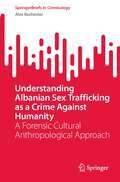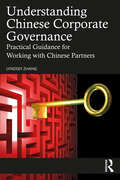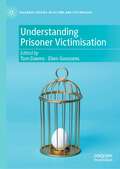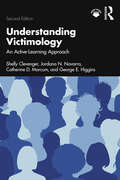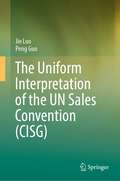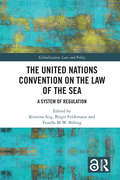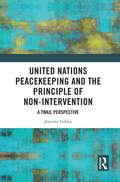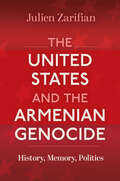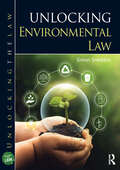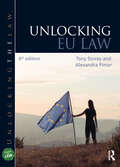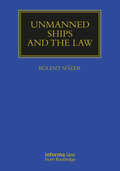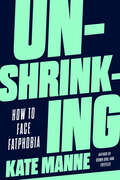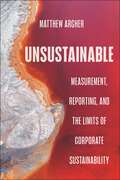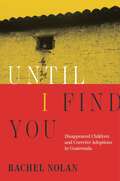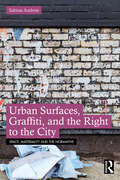- Table View
- List View
The Trial of a Nazi Doctor: Franz Lucas as Defendant, Opportunist, and Deceiver
by Andrew WiselyThe Trial of a Nazi Doctor examines the life of Franz Bernhard Lucas (1911-1994), an SS camp doctor with assignments in Auschwitz, Mauthausen, Stutthof, Ravensbrück, and Sachsenhausen. Covering his career during the Third Reich and then his prosecution after 1945, especially in the Frankfurt Auschwitz trial, Andrew Wisely explores the lies, obfuscations, misrepresentation, and confusions that Lucas himself created to deny, distract from or excuse his participation in the Nazi’s genocidal projects. By juxtaposing Lucas’s own testimonies and those of a wide range of witnesses: former camp inmates and Holocaust survivors; friends, colleagues, and relatives; and media observers, Wisely provides a nuanced study of witness testimonies and the moral identity of Holocaust perpetrators.
Tribe-Class Linkages: The History and Politics of the Agrarian Movement in Tripura
by Saqib KhanThis book is a historical study of the development of agrarian class relations among the tribal population in Tripura. Tracing the evolution of Tripura and its agrarian relations from monarchy in the nineteenth century to democracy in the twentieth century, the book discusses the nature of the erstwhile princely state of Tripura, analyses the emergence of differentiation within tribes, and documents the emergence of the tribal movement in the state. It specifically focuses on the tribal movement led by the Ganamukti Parishad, beginning with the historic revolt of 1948-51 against state repression on the tribal people, followed by the mass movements in the 1950s and 1960s, which were founded on a recognition of class relations and the slogan of unity across the tribal and non-tribal (Bengali) peasantry. The first of its kind, the book will be indispensable for students and researchers of tribal studies, agrarian studies, exclusion studies, tribe-class relationships, minority studies, sociology, development studies, history, political science, north-east India studies, and South Asian studies. It will also be useful for activists and policymakers working in the area.
The Trump Indictments: The Historic Charging Documents With Commentary
by Melissa Murray Andrew WeissmannCollecting the four unprecedented indictments against Donald Trump, this essential volume features extensive commentary by NYU law professors and MSNBC contributors Melissa Murray and Andrew Weissmann. <p><p> In the long span of American history, Donald Trump is the first former president to face criminal indictment. He is the subject of a series of explosive charges across four cases: the January 6 case brought by Special Counsel Jack Smith; the election interference case in Georgia; the classified documents case also brought by Special Counsel Jack Smith; and the "hush money" case in New York. The Trump Indictments includes: • An introduction offering historical background and international comparisons for criminal charges against a former political leader. • The four indictments with annotations throughout, including insider notes from an eminent scholar (Murray) and a former federal prosecutor (Weissmann). • A cast of characters, from Trump and his alleged co-conspirators to notable Proud Boys and Oath Keepers who face prison sentences as a result of related January 6 cases. • A timeline that brings together in one place the critical events that led to the four indictments. A necessary handbook for anyone following the trials in 2024, The Trump Indictments will endure as an indispensable record of a democracy at the crossroads. <p> <b>New York Times Bestseller</b>
Trust and Organizational Resilience (Routledge Studies in Trust Research)
by Iwona Otola Marlena Grabowska Zoran KrupkaIn a turbulent environment, companies face disruptive events and must build organisational resilience in order to thrive. This unique book offers new, cutting-edge research on how trust can build and develop resilience. The authors combine theoretical and empirical perspectives on the two issues of trust and organisational resilience in an environment that is difficult to predict. The authors firstly discuss the challenges the turbulent environment poses before exploring the influence of trust and providing practical case studies on topics such as brand trust, dynamic capabilities and business models. Examples are drawn from high-growth enterprises demonstrating first-hand how organisations that develop trust have survived turbulent conditions. This novel book is the first to combine the two disciplines of trust and resilience and will be a valuable reference for researchers and upper level students of strategic management and crisis management in particular.
Trust, Courts and Social Rights: A Trust-Based Framework for Social Rights Enforcement (Cambridge Studies in Constitutional Law)
by null David VitaleTrust, Courts and Social Rights proposes an innovative legal framework for judicially enforcing social rights that is rooted in public trust in government or 'political trust'. Interdisciplinary in nature, the book draws on theoretical and empirical scholarship on the concept of trust across disciplines, including philosophy, sociology, psychology and political theory. It integrates that scholarship with the relevant public law literature on social rights, fiduciary political theory and judicial review. In doing so, the book uses trust as an analytical lens for social rights law – importing ideas from the scholarship on trust into the social rights literature – and develops a normative argument that contributes to the controversial debate on how courts should enforce social rights. Also global in focus, the book uses cases from courts in Africa, Europe, Latin America and North America to illustrate how the trust-based framework operates in practice.
Turkish Secularism: How to Raise Its Level of Protection (European Union and its Neighbours in a Globalized World #12)
by Tarlan MasmaliyevaThere are any number of studies on Turkish secularism. However, to date there has never been a comprehensive analysis of the constitutional protection of secularism, one that systematically covers all relevant aspects. Addressing that gap, this book presents a comprehensive and coherent analysis of the constitutional framework of this principle within the Turkish legal system.Secularism is a common fundamental principle of all three Turkish constitutions (1924, 1961, 1982). The principle has been granted an irrevocable status and has been strictly constructed within the Turkish constitutional system. Despite the guarantee of irrevocability, however, its interpretation and application have undergone a drastic transformation in response to changing social and political circumstances.Today, the complaints filed before the domestic and international judiciary predominantly concern the Turkish State’s neutrality and impartiality towards religion and the exercise of freedom of religion by religious minorities. While many observers have interpreted these problems in light of the contemporary policies pursued in the field of religion, a closer look reveals that the problem lies deeper in Turkey’s general constitutional framework. While the 1982 Constitution declares the principle as an unamendable characteristic of the Republic and protects it with multi-layered mechanisms, certain anti-democratic features of the Constitution, including the President’s predominant role in forming the high-ranking judiciary, affect the proper and consistent application of the principle of secularism.The consolidation of the secular state order depends on various factors other than a suitable constitution. However, it goes without saying that constitutions can help or hinder efforts to find solutions. Therefore, this book identifies the deficiencies in the Turkish constitutional and legal framework regarding the protection of secularism. It presents the historical development and definition of a secular state, analyzes the jurisprudence of the Turkish Constitutional Court and the European Court of Human Rights, studies the application of the party prohibition mechanism as a means of protecting the principle, and assesses the constitutional amendments of 2001, 2010 and 2017. Moreover, it proposes much-needed constitutional and legal amendments with a view to improving the application of the principle of secularism.
The UN Security Council and the Maintenance of Peace in a Changing World (Max Planck Trialogues)
by null Congyan Cai null Larissa van den Herik null Tiyanjana MaluwaHow can the UN Security Council contribute to the maintenance of international peace and security in times of heightened tensions, global polarisation, and contestation about the principles underlying the international legal and political order? In this Trialogue, experts with diverse geographic, socio-legal, and ideational backgrounds present their perspectives on the Security Council's historic development, its present functions and deficits, and its defining tensions and future trajectories. Three approaches engage with each other: a power-focused approach emphasising the role of China as an emerging actor; an institutionalist perspective exploring how less powerful states, particularly the elected members of the Security Council, exert influence and may strengthen rule-of-law standards; a regionalist perspective investigating how the Security Council as the central actor can cooperate with regional organisations towards maintaining international peace and security. This title is also available as Open Access on Cambridge Core.
Uncommon Sense
by Ian ShapiroA spirited defense of the Enlightenment against assaults from both the left and the right that explains its urgent implications for our contemporary politics Ours is an age when optimism about politics is hard to come by. Ian Shapiro explains why this is so and, without minimizing the daunting challenges, spells out an appropriate response. Written in the indomitable spirit exemplified by Tom Paine, Uncommon Sense is a rich source of insight and inspiration in dark political times. The Enlightenment commitments to reason and science are under assault from the Postmodern Left and the Authoritarian Right. Shapiro explains why the attacks are misguided and politically destructive. He agrees with the critics that there are no universal principles of justice that transcend political battles and no fair, impartial rules to govern the distribution of income, wealth, rights, or opportunities. But abandoning the search for them as futile does not mean junking the Enlightenment&’s core political goal: to deploy the tools of reason and science to fight domination. Democracy is essential to vindicating that goal, yet citizens in many democracies are profoundly alienated and many democracies are in danger of failing. Shapiro explains what has gone wrong, debunks ill-considered remedies, and spells out better ones—deepening and extending his previous writing on political theory and democratic politics.
Understanding Albanian Sex Trafficking as a Crime Against Humanity: A Forensic Cultural Anthropological Approach (SpringerBriefs in Criminology)
by Alex RochesterThis volume considers the most appropriate criminal jurisdiction to prosecute aggravated sex trafficking of the kind associated with northern Albanian crime groups. Watershed jurisprudence from the Yugoslav war crimes tribunal could prove pivotal to achieving the legislative changes for prosecuting Albanian sex trafficking in peacetime that this book advocates. This book revisits this relevant history to challenge the current transnational status of trafficking as a mischaracterisation. It is maintained that the Albanian sex trafficker has become, like the wartime rapist before him, the perpetrator of an offence that warrants recognition by the international criminal justice regime. The book considers the historico-cultural legacies of present-day root-causes of Albanian sex trafficking to understand how the same dehumanising ideology and sexual violence aimed at women during the Yugoslav Wars persisted post-conflict and continues to underscore contemporary Albanian sex trafficking and what these similarities in assailant attitudes and actions might mean for potentially prosecuting human trafficking within the international criminal justice system. Through the prism of neutralisation theory rooted in forensic cultural anthropology, in the form of a novel hypothetical model, a conceptual framework to consider the true nature of trafficking is offered. The model offers a précised interpretation of the key factors that establish certain criminal conduct as suitable for international criminal justice and how those factors relate to Albanian sex trafficking. The model distils the characteristics of Albanian sex trafficking; it extracts the essential elements and most important aspects of this type of criminality so we can recognise their presence in real-world cases. A case study featuring interviews with the traffickers themselves and individuals who have encountered them firsthand then describes how the model holds for the real-world experience of Albanian sex trafficking. Approached from the trafficker angle, the purpose of the case study is to support the theoretical model by showing how each element manifests in Albanian sex trafficking. For a richer understanding, each of the elements is explained and explored within a historico-cultural context. The chapters in this book feature key topics and supporting material, including: The backstory, purpose, and structure of the international criminal justice system followed by how the regime could and should be extended to encompass aggravated sex trafficking.The role of culturally-shaped neutralization theory in understanding decision-making in sex trafficking on the individual levelHistorico-cultural context, including competing elements of tradition and modernityLongstanding gender attitudes, particularly evaluating violence against womenInterviews with Albanian sex traffickers and victims By evaluating Albanian sex trafficking through this lens, this book aims to identify international criminal justice as a more appropriate and effective approach to prosecuting aggravated sex trafficking and to suggest future opportunities for further research that can aid in improved policing and prisoner management as it relates to Albanian sex trafficking. This book is ideal for students and academic researchers interested in international criminal justice and sex trafficking studies.
Understanding Chinese Corporate Governance: Practical Guidance for Working with Chinese Partners
by Lyndsey ZhangIn a complex political and environmental global landscape, it has never been more critical for global organizations to understand the past, present, and future of Chinese corporate governance: this book is the key. Leveraging her dual-cultural background and using a board-level practitioner’s lens, Lyndsey Zhang offers insights that will help the global business community better understand Chinese companies’ corporate governance practices and economic development journeys, shorten the learning curve for global business leaders and investors, and explore different economic models that better suit emerging markets. She addresses important questions such as: • How does the Chinese government manage to retain its controlling position in Chinese companies while still making them attractive to global investors? • What are the drivers for Chinese companies’ future corporate governance improvement? • What is China’s position on the worldwide ESG and climate change movements? • How can global practitioners feel less like "navigating in the dark" when working with Chinese companies? This book will be an invaluable resource for anyone seeking to understand the rapidly changing world of Chinese corporate governance, including global investors, senior executives in multinational corporations, consultants, financial and political policymakers, business and law students, and researchers.
Understanding Prisoner Victimisation (Palgrave Studies in Victims and Victimology)
by Tom Daems Elien GoossensPeople in prison are usually (and often exclusively) seen and approached as persons who have committed one or more crimes and who have to pay their debt to society. However, while in prison, they often get victimised themselves. Research has demonstrated that prisons tend to be unsafe environments where various forms of victimisation take place. These forms of victimisation often go unnoticed and usually do not attract much interest from policymakers or society at large: prisoners are, indeed, far from ‘ideal victims’. This book is devoted to understanding prisoner victimisation, in particular from a European perspective. Chapters in this volume focus on recent empirical work in a number of European countries (Belgium, England and Wales and the Netherlands). These chapters are complemented with a series of reflections from a conceptual, methodological and human rights perspective.
Understanding Victimology: An Active-Learning Approach
by Shelly Clevenger Jordana N. Navarro Catherine D. Marcum George E. HigginsUnderstanding Victimology: An Active Learning Approach is the only textbook with extensive discussion of both online and offline victimization reinforced by group and individual learning activities. Our textbook offers instructors a variety of active learning exercises – in the book itself and in the authors’ ancillaries – that engage students in the material and shed light on the experiences of marginalized social groups. Through these activities, students become engaged with the material at a higher level of learning. They learn how victimization happens and the challenges people who experience crime face in acquiring assistance from the criminal-legal system at a more intimate level instead of simply reading about it. Students also build their abilities to work with others in a collaborative learning environment, encouraging professional socialization for the future. The chapters in this second edition address gaps in information typically presented in victimology that ignore prevention or intervention, even though these topics are currently at the forefront of the national conversation going on about sexual violence in higher education. New to this edition are added coverage of immigrants and minorities and new chapters on the media and victimization and on victimization across the gender spectrum, as well as an online instructor resource covering UK case studies, legal framework, and social context that broadens the book’s global appeal. Suitable for undergraduate courses in victimology, this book also serves the needs of sociology and women’s studies courses and can be taught university-wide as part of diversity and inclusion initiatives.
The Uniform Interpretation of the UN Sales Convention (CISG)
by Jie Luo Peng GuoThe unification of international commercial law has been a common course for every country of the world. The U.N. Convention on Contracts for International Sale of Goods (CISG) is a milestone in creating a uniform law in the field of the international sale of goods. The CISG coordinated divergent political, economic, and legal systems combined different contract laws and set up a comprehensive and independent legal framework for the international sale of goods. This book examines the basic requirements and criteria of the CISG’s interpretation and investigates how to achieve the uniform interpretation of the CISG based on interpretation rules in the CISG and through appropriate legal interpretation approaches. As a comprehensive and uniform legal framework for the international sale of goods, the CISG still has gaps to fill. Therefore, a uniform interpretation in gap-filling is equally important for the CISG. This book discusses gap-filling in the CISG, explains why and how to fill its gaps, clarifies gap-filling approaches, their order of application, and eventually concentrates on general principles and the uniform interpretation of the CISG. Another feature of the book is to discuss the supplementary materials that could be used to assist in the uniform interpretation of the CISG. PICC, foreign cases, UNCITRAL Digest, and the CISG Advisory Council opinions will be examined in detail to see whether and how they can fill the gaps in the CISG and promote its uniform interpretation. Only by clarifying the basic requirements and principles relating to the CISG’s uniform interpretation, can courts and arbitral tribunals correct their attitude toward and practices in the interpretation of the CISG. Only by following the autonomous interpretation approach, can the CISG achieve its goal to unify the sale of goods laws and promote the development of international commerce.
The United Nations Convention on the Law of the Sea: A System of Regulation (Globalization: Law and Policy)
by Kristina Siig Birgit Feldtmann Fenella M.W. BillingThe 1982 United Nations Convention on the Law of the Sea (UNCLOS) has for four decades been considered by many to be one of the most important legislative achievements of international law. It is revered as a "constitution of the oceans", providing the legal framework for the governance of the oceans. This volume explores how the UNCLOS is functioning in various complex settings, how it adapts to new, emerging developments, as well as how it interacts with other regulation, both within the law of the sea regime and outside. Engaging in themes such as law and order at sea, UNCLOS’ interaction with human rights and the role of private actors, the book raises complex questions in the application, understanding, and enforcement of the convention and how it can be envisaged, interpreted, and used in a dynamic world. The volume also raises methodological questions, the answers to which may enhance the predictability and coherence of the law under UNCLOS and thus secure its role as the predominant and relevant system for legal governance at sea for many decades to come. As a contribution to ensuring the future relevance of UNCLOS, the book will be a valuable resource for scholars, diplomats, judges and other practitioners who are working with and interpreting the law of the sea and related issues of maritime law, migration law, human rights law and humanitarian law.
The United Nations Convention on the Law of the Sea: A System of Regulation (Globalization: Law and Policy)
by Kristina Siig Birgit Feldtmann Fenella M.W. BillingThe 1982 United Nations Convention on the Law of the Sea (UNCLOS) has for four decades been considered by many to be one of the most important legislative achievements of international law. It is revered as a "constitution of the oceans", providing the legal framework for the governance of the oceans. This volume explores how the UNCLOS is functioning in various complex settings, how it adapts to new, emerging developments, as well as how it interacts with other regulation, both within the law of the sea regime and outside. Engaging in themes such as law and order at sea, UNCLOS’ interaction with human rights and the role of private actors, the book raises complex questions in the application, understanding, and enforcement of the convention and how it can be envisaged, interpreted, and used in a dynamic world. The volume also raises methodological questions, the answers to which may enhance the predictability and coherence of the law under UNCLOS and thus secure its role as the predominant and relevant system for legal governance at sea for many decades to come.As a contribution to ensuring the future relevance of UNCLOS, the book will be a valuable resource for scholars, diplomats, judges and other practitioners who are working with and interpreting the law of the sea and related issues of maritime law, migration law, human rights law and humanitarian law.
United Nations Peacekeeping and the Principle of Non-Intervention: A TWAIL Perspective
by Jennifer GiblinUsing a unique application of Third World Approaches to International Law (TWAIL), this book provides a critical, interdisciplinary, examination of the contemporary practice of UN peacekeeping.Is peacekeeping intervention? Since its conception in the mid-1950s, peacekeeping has significantly evolved from traditional, lightly armed, passive operations to robust, multi-dimensional stabilisation peacekeeping operations. This raises questions as to whether this is simply a natural evolution of peacekeeping or whether it marks an expansion of the concept beyond its boundaries, pushing it into the realm of peace enforcement or intervention. In response, this book examines the frameworks which govern UN peacekeeping and seeks to understand the relationship between peacekeeping and the principle of non-intervention. Providing practical examples from the United Nations’ operations in the Democratic Republic of the Congo and drawing upon interviews with key international actors including UN personnel, the book explores the boundaries of peacekeeping, contending that peacekeeping, at times, becomes a form of intervention. This, the book argues, is detrimental both to the concept of peacekeeping and to the host state, and it concludes by offering a series of recommendations to re-affirm peacekeeping’s boundaries and amplify the effectiveness of contemporary peacekeeping. This book will be of interest to scholars and students in international law, international relations, politics, history and criminology.
The United States and the Armenian Genocide: History, Memory, Politics (Genocide, Political Violence, Human Rights)
by Julien ZarifianDuring the first World War, over a million Armenians were killed as Ottoman Turks embarked on a bloody campaign of ethnic cleansing. Scholars have long described these massacres as genocide, one of Hitler’s prime inspirations for the Holocaust, yet the United States did not officially recognize the Armenian Genocide until 2021. This is the first book to examine how and why the United States refused to acknowledge the Armenian Genocide until the early 2020s. Although the American government expressed sympathy towards the plight of the Armenians in the 1910s and 1920s, historian Julien Zarifian explores how, from the 1960s, a set of geopolitical and institutional factors soon led the United States to adopt a policy of genocide non-recognition which it would cling to for over fifty years, through Republican and Democratic administrations alike. He describes the forces on each side of this issue: activists from the US Armenian diaspora and their allies, challenging Cold War statesmen worried about alienating NATO ally Turkey and dealing with a widespread American reluctance to directly confront the horrors of the past. Drawing from congressional records, rare newspapers, and interviews with lobbyists and decision-makers, he reveals how genocide recognition became such a complex, politically sensitive issue.
Unlocking Environmental Law (Unlocking the Law)
by Simon SneddonUnlocking Environmental Law is the essential introduction to this fascinating, controversial, and fast-moving area of contemporary law, ensuring that you grasp the main concepts with ease. Containing accessible explanations in clear and precise terms that are easy to understand, it provides an excellent foundation for learning and revising Environmental Law. Split into three parts, the book outlines the philosophical foundations of environmental law, and how these have influenced political decision-making. The information is clearly presented in a logical structure and the following features support learning, helping you to advance with confidence: • clear learning outcomes at the beginning of each chapter set out the skills and knowledge you will need to get to grips with the subject; • key facts boxes throughout each chapter allow you to progressively build and consolidate your understanding; • end-of-chapter summaries provide a useful check-list for each topic; •cases and judgments are highlighted to help you find them and add them to your notes quickly; • frequent activities and self-test questions and sample essay questions are included so you can put your knowledge into practice; • a brand new ‘critiquing the law’ feature is designed to foster essential critical thinking skills. Charting the development of regulations, examining emerging and future trends for environmental law, and looking at specific areas of law, including air pollution, climate change, laws around water, and the regulation of social and private space, this concise, accessible text is ideal for anyone new to environmental law.
Unlocking EU Law (Unlocking the Law)
by Tony Storey Alexandra PimorEuropean Union Law is a core element of every law degree in England and Wales. Unlocking EU Law will ensure you grasp the main concepts with ease. Containing accessible explanations in clear and precise terms that are easy to understand, it provides an excellent foundation for learning and revising EU Law. The information is clearly presented in a logical structure and the following features support learning, helping you to advance with confidence: Clear learning outcomes at the beginning of each chapter set out the skills and knowledge you will need to get to grips with the subject; Key Facts boxes throughout each chapter allow you to progressively build and consolidate your understanding; End-of-chapter summaries provide a useful check-list for each topic; Cases and judgments are highlighted to help you find them and add them to your notes quickly; Frequent activities and self-test questions and sample essay questions are included so you can put your knowledge into practice; A brand new ‘critiquing the law’ feature is designed to foster essential critical thinking skills. This 6th edition has been fully updated to include discussion of all key changes and developments in the law, including new legal provisions in relation to Covid-19, major case developments and changes to legal treaties.
Unmanned Ships and the Law (Maritime and Transport Law Library)
by BÜLENT SÖZERThis book considers the law relating to the legal aspects of unmanned ships. The author, a doyen of shipping and insurance law from Turkey, delves into the current international legal regime and examines the probable impact of unmanned ships on liability and carriage of goods in a wide-ranging manner. He examines both the legal aspects and technological peculiarities of unmanned ships, as well as contemplating terminological and linguistic questions, to find out whether they can be compatible with the current legal regime applicable to ships in general, while considering alternatives to enable their successful use in the near future. Unmanned Ships and the Law is therefore important not just for legal practitioners and academics in shipping and insurance but all those in related industries of shipbuilding, computer technology and communications.
Unshrinking: How to Face Fatphobia
by Kate ManneThe definitive takedown of fatphobia, drawing on personal experience as well as rigorous research to expose how size discrimination harms everyone, and how to combat it—from the acclaimed author of Down Girl and Entitled&“An elegant, fierce, and profound argument for fighting fat oppression in ourselves, our communities, and our culture.&”—Roxane Gay, author of HungerFor as long as she can remember, Kate Manne has wanted to be smaller. She can tell you what she weighed on any significant occasion: her wedding day, the day she became a professor, the day her daughter was born. She&’s been bullied and belittled for her size, leading to extreme dieting. As a feminist philosopher, she wanted to believe that she was exempt from the cultural gaslighting that compels so many of us to ignore our hunger. But she was not.Blending intimate stories with the trenchant analysis that has become her signature, Manne shows why fatphobia has become a vital social justice issue. Over the last several decades, implicit bias has waned in every category, from race to sexual orientation, except one: body size. Manne examines how anti-fatness operates—how it leads us to make devastating assumptions about a person&’s attractiveness, fortitude, and intellect, and how it intersects with other systems of oppression. Fatphobia is responsible for wage gaps, medical neglect, and poor educational outcomes; it is a straitjacket, restricting our freedom, our movement, our potential.In this urgent call to action, Manne proposes a new politics of &“body reflexivity&”—a radical reevaluation of who our bodies exist in the world for: ourselves and no one else. When it comes to fatphobia, the solution is not to love our bodies more. Instead, we must dismantle the forces that control and constrain us, and remake the world to accommodate people of every size.
Unsustainable: Measurement, Reporting, and the Limits of Corporate Sustainability
by Matthew ArcherA behind-the-scenes look at how corporate and financial actors enforce a business-friendly approach to global sustainabilityIn recent years, companies have felt the pressure to be transparent about their environmental impact. Large documents containing summaries of yearly emissions rates, carbon output, and utilized resources are shared on companies’ social media pages, websites, and employee briefings in a bid for public confidence in corporate responsibility.And yet, Matthew Archer argues, these metrics are often just hollow symbols. Unsustainable contends with the world of big banks and multinational corporations, where sustainability begins and ends with measuring and reporting. Drawing on five years of research among sustainability professionals in the US and Europe, Unsustainable shows how this depoliticizing tendency to frame sustainability as a technical issue enhances and obscures corporate power while doing little, if anything, to address the root causes of the climate crisis and issues of social inequality. Through this obsession with metrics and indicators, the adage that you can’t manage what you can’t measure transforms into a belief that once you’ve measured social and environmental impacts, the market will simply manage them for you.The book draws on diverse sources of evidence—ethnographic fieldwork among a wide array of sustainability professionals, interviews with private bankers, and apocalyptic science fiction—and features analyses of name-brand companies including Volkswagen, Unilever, and Nestlé. Making the case for the limits of measuring and reporting, Archer seeks to mobilize alternative approaches. Through an intersectional lens incorporating Black and Indigenous theories of knowledge, power and value, he offers a vision of sustainability that aims to be more effective and more socially and ecologically just.
Until I Find You: Disappeared Children and Coercive Adoptions in Guatemala
by Rachel NolanThe poignant saga of Guatemala’s adoption industry: an international marketplace for children, built on a foundation of inequality, war, and Indigenous dispossession.In 2009 Dolores Preat went to a small Maya town in Guatemala to find her birth mother. At the address retrieved from her adoption file, she was told that her supposed mother, one Rosario Colop Chim, never gave up a child for adoption—but in 1984 a girl across the street was abducted. At that house, Preat met a woman who strongly resembled her. Colop Chim, it turned out, was not Preat’s mother at all, but a jaladora—a baby broker.Some 40,000 children, many Indigenous, were kidnapped or otherwise coercively parted from families scarred by Guatemala’s civil war or made desperate by unrelenting poverty. Amid the US-backed army’s genocide against Indigenous Maya, children were wrested from their villages and put up for adoption illegally, mostly in the United States. During the war’s second decade, adoption was privatized, overseen by lawyers who made good money matching children to overseas families. Private adoptions skyrocketed to the point where tiny Guatemala overtook giants like China and Russia as a “sender” state. Drawing on government archives, oral histories, and a rare cache of adoption files opened briefly for war crimes investigations, Rachel Nolan explores the human toll of an international industry that thrives on exploitation.Would-be parents in rich countries have fostered a commercial market for children from poor countries, with Guatemala becoming the most extreme case. Until I Find You reckons with the hard truths of a practice that builds loving families in the Global North out of economic exploitation, endemic violence, and dislocation in the Global South.
Urban Surfaces, Graffiti, and the Right to the City
by Sabina AndronThis landmark book focuses on urban surfaces, on exploring their authorship and management, and on their role in struggles for the right to the city. Graffiti, pristine walls, advertising posters, and municipal signage all compete on city surfaces to establish and imprint their values on our environments. It is the first time that the surfacescapes of our cities are granted the entire attention of a book as material, visual, and legal territories. The book includes a critical history of graffiti and street art as contested surface discourses and argues for surfaces as sites of resistance against private property, neoliberal creativity, and the imposition of urban order. It also proposes a seven-point manual for a semiotics of urban surfaces, laying the ground for a new discipline: surface studies. Page after page and layer after layer, surfaces become porous and political and emerge as key spatial conditions for rethinking and re-practicing urban dwelling and spatial justice. They become what the author terms the surface commons. The book will appeal to a wide readership across the disciplines of urban studies, architectural theory and design, graffiti, street art and public art, criminology, semiotics, visual culture, and urban and legal geography. It will also serve as a tool for city scholars, policy makers, artists, and vandals to disrupt existing imaginaries of order, justice, and visibility in cities.
Urban Surfaces, Graffiti, and the Right to the City (ISSN)
by Sabina AndronThis book explores the ownersheir authorship and management, and their role in struggles for the right to the city. Includes a critical history of graffiti and street art as contested surface discourses. Interdisciplinary appeal.
